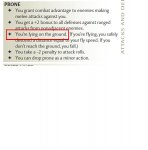I don't want to put words in your mouth, so I apologize if this is not what you were intending... but, these two items seem (to me) to assume the following...
1) That every time a DM makes a change to a power, they are "trashing" it.
2) That ever DM has (at least some) prized monsters that they are willing to "trash" powers for in order to see them survive (longer).
Neither of those are the case for me, ever, and I think that if you are assuming this kind of "DM vs Player" mentality right off the bat, you are going to see that (whether it is there or not) all the time.
I think the word "trashing" was poorly chosen on my part. My example meant to paint a picture of an encounter that the players practically circumvent that the DM had spent considerable time and effort on and was looking forward to. Not that he wanted the snakes to win or survive, just that he figured this was going to be a dynamic, engaging encounter that would test their abilities and then one player one-shots it.
The bad DM response, my example, would be to thwart that player after he does so with a retcon'd immunity. If he did so, and the encounter went on to be dynamic and engaging all would likely be forgiven or forgotten or never noticed. But as DM policy, I think it's a poor way to go on a regular basis. The players thwarting a combat or trap is often a highlight unto itself.
Similarly, I think it would be a poor way to go to often thwart the effects of a PCs powers because it's a stretch in a particular situation. I would say doubly so in the case of doing it only to melee powers and not worrying about verisimilitude issues with magic, as that would tend to unfairly punish melee characters at the expense of the balance of the system.
Speaking only for myself, I have no personal stake in anything I lay down on the table. If I put it down, I do so expecting it to die/be destroyed - because I don't put anything on the table with the idea of "this will certainly wipe the party" or, "there's no way I'm letting the players mess this thing up".
Of course you expect it to die. But did you expect it die to one shot, in the first round, before it got to show off any of the things you had designed it to do? Have you never had a situation where the players skipped entirely some encounter you thought was going to be a highlight, or completely thwarted what you planned to be some wildly engaging, multi-dimensional super encounter (RP, combat, skill based, whatever)?
That situation doesn't compare directly to the DM disallowing a power because he can't make sense of it situationally, but from the player end, they are pretty similar - the DM countering PC abilities after-the-fact to service his own expectations. That's the crux of my examples.
It can be confrontational, sure - but in most cases, I think it's only confrontational if you (anyone) want it to be. To me, it would simply be odd. I would ask the DM (politely, after the game) if there were special reasons why there were a number of changes to my powers made at the table (assuming this was a regular thing), because there might be a good reason.
Oh definitely. Interrupting the game for that discussion is a no-no. But if the answer was, "it didn't make sense to me that your melee fighter could compel my creatures to move toward you, or that you could knock a snake prone, etc." I would explain how I could rationalize those considering the overall abstractness of combat. Now, if I was playing a melee fighter and the DM continued to modify his monsters and thwart my powers secondary effects because they don't make as much sense to him because they are "mundane" and not magical, we're going to enter Thunderdome territory, as that is contrary to the conceits of the agreed upon game system we are using, which brings us back to the core of this thread in general, I think.
Which, to Wik (see what I did there?), I would say, if it doesn't work you, even if you can't quite put your finger on it or whether or not the game has truly changed or its just your perception, play something else that DOES work for you and don't fret too much about it. We can have an interesting and varied discussion (and have) about whether the conceits of the game have really changed between how attacking against static defenses play out versus how the similar player-tells-your-monster-what-to-do abilities of previous editions worked or if its a more tenuous perceptual difference. But the end result is the same - if it doesn't work for you, it doesn't work for you.



